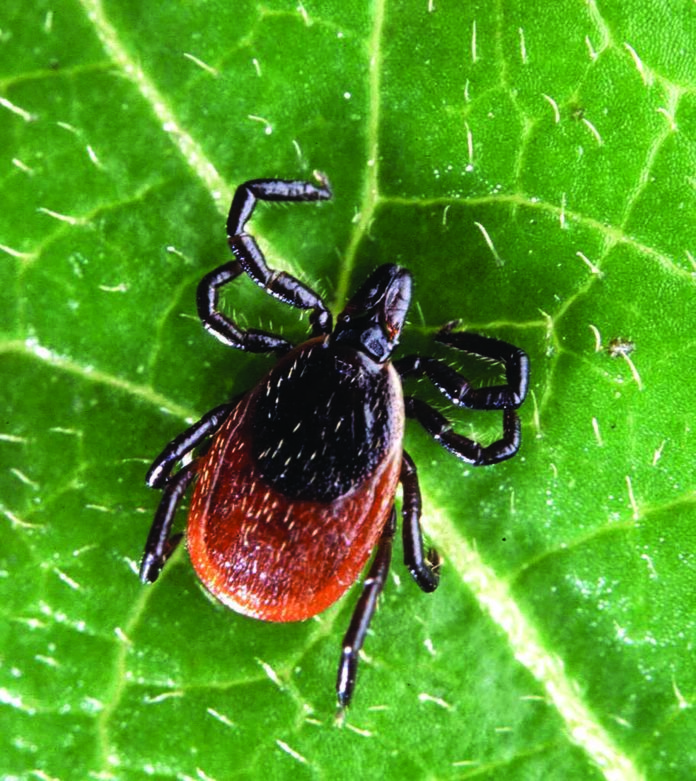by Rosella Stewart
It’s that time of year again! Tick season on the North Shore is already in full rage. Beginning in early March and sticking through the tourist season until the end of November, tick season is a unique battle for families of the area. Newcomers to the North Shore area are most at risk of finding ticks around. With the proper information and preventative care, summer fun doesn’t have to revolve around tick maintenance.
Furry friends and yards are especially popular breeding grounds for ticks this time of year. Dr. Grace K. Brown, Medical Director of the Lake County Veterinary Clinics, PLLC, informs that one of the simplest ways to prevent tick migration through the yard and home is creating a “tick safe zone” around the house and frequently used outdoor areas like sidewalks, gardens, or dog fences.
Tick safe zones aim to reduce the mobility of blacklegged ticks, which spread lyme disease the most frequently. Owners should remove brush, leaves, branches, and litter from tick safe zones and ensure that there is nothing obstructing the openness of the space that would allow ticks to jump from object to object.
Dr. Brown also recommends that a barrier of wood chips or gravel be placed between lawns and wooded areas, at least three feet wide, to keep ticks even further from recreational areas.
Dogs are the most at risk of contracting tick bites and tick borne illnesses. Vaccines are unfortunately not available for most tick borne diseases, so prevention is key. Ticks found on pets can be smaller than a pinhead, so checking your pets before entering the tick safe zones will allow for early prevention. Ticks like easy access to blood, so they will perch as close to the skin as possible. Check your pets’ scalp and look for any dark bugs or spots against the whiteness of the scalp for easy recognition.
If there is any risk of a tick bite on your pets, watch for any emotional changes they may exhibit over the next two weeks. Many symptoms of tick borne disease will not appear until up to twenty days after infection, so noting any behavioral changes will assist in the prevention of the illness. Watch for fever, lethargy, inability to walk normally, or any other changes in your pets’ normal behavior.
If you plan to take your pets outside at all during tick season, Dr. Brown highly encourages the appropriate flea and tick prevention treatment for each animal. Recommended flea and tick prevention treatments available at Lake County Veterinary Clinics, PLLC, include Bravecto and Simparica as oral supplements for dogs, Vectra 3D as a topical treatment for dogs, and Bravecto Plus for cats.
Do note, cats are very sensitive to a wide variety of chemicals. In order to keep your cats safest, Dr. Brown urges pet owners to seek the advice of a veterinarian on safe products for their cats before applying anything.
If you notice a tick head becomes embedded in the skin, seek care from a veterinary clinic at your earliest convenience. They have special tools at hand to allow the tick head to be released in one piece and remove any embedded mouth parts, which can cause disease. It is necessary for both people and pets that tick heads be removed from the skin to reduce the chances of infection and transmission.
Keep a clean pair of fine-tipped tweezers in the home for tick removal. If the head has not yet gotten into the skin, grasp the tick with the tweezers as close to the head as possible. Pulling upward with steady and consistent pressure, the tick should be removed. Dr. Brown notes not to twist or jerk the tick during the removal process, as this could allow the mouth pieces to break off and reenter the skin.
After removal, clean the bite area and wash your hands. Dispose of the tick by placing it in alcohol in a sealed container and either wrapping it with tape or flushing it down the toilet. Squeezing or attempting to crush a tick will not kill it.
Call the nearest veterinarian about the location and reaction of the skin to the tick bite after removal. This will allow the clinic to ensure that your pet is on the best possible preventative products.
Symptoms of tick borne diseases in pets include fever, chills, aches and pains, lameness, restless limbs, and out of the ordinary behavioral and neurological symptoms. Reach out to your local veterinary clinic as soon as you notice any!
With the right preventative measures, summers outdoors with your pets can be as carefree and adventurous as ever. Get started on preparing your homes and yards and take your dog out for some summer fun!
For any veterinary assistance or questions, reach out to Dr. Grace K. Brown or the other veterinary experts at Lake County Veterinary Clinics, PLLC.
(218) 834-4234 or (218) 387-1383




